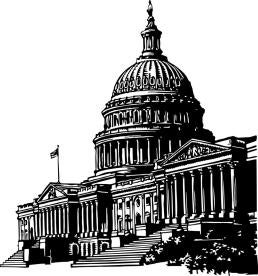Legislation passed by the U.S. House of Representatives threatens to shake up the Securities and Exchange Commission’s enforcement program in a historic manner.
The Financial CHOICE Act (the “CHOICE Act”), which was passed by the House of Representatives on June 8, 2017,1 would make substantial changes to financial regulation in the United States, including repealing or curtailing significant aspects of the Dodd-Frank Wall Street Reform and Consumer Protection Act (the “Dodd-Frank Act”).2 Notably, the CHOICE Act includes provisions that limit the ability of the Securities and Exchange Commission (the “SEC”) to use in-house administrative proceedings. Among other changes to current law, the CHOICE Act would permit respondents to remove SEC administrative proceedings to federal district court, impose a higher burden of proof on the SEC in administrative proceedings, and preclude the SEC from barring individuals from serving as officers or directors through administrative proceedings. The CHOICE Act also contains provisions limiting the SEC’s use of new legal theories and that make it more difficult for the SEC to impose monetary penalties on corporations. As a result, if passed in some form in the Senate, the CHOICE Act presents the SEC and parties subject to SEC investigations and enforcement actions with new strategic challenges and opportunities.
The Dodd-Frank Act Expanded the SEC’s Ability to Utilize Administrative Proceedings in lieu of Proceeding in Court
Title IX of the Dodd-Frank Act expanded the type of penalties the SEC could seek in administrative proceedings and broadened the scope of bars or suspensions the SEC could impose. Notably, Title IX authorized the SEC to impose substantial civil monetary penalties on all persons through proceedings before in-house administrative law judges (“ALJs”).3 Previously, the SEC was required to go to federal court to seek civil monetary penalties, unless the defendant was associated with a regulated enterprise such as a broker-dealer, investment adviser or investment company. Otherwise, pre-Dodd-Frank law limited the SEC’s power over non-registrants to issuing cease-and-desist orders and ordering the “disgorgement” of illegal profits. For this reason, the SEC often settled enforcement actions against non-registrants in two steps: (i) initiating in-house administrative proceedings to impose cease-and-desist orders and ancillary relief, and (ii) initiating civil actions in federal court to seek the imposition of civil monetary penalties.
By virtue of the changes wrought by the Dodd-Frank Act the SEC could and often did increasingly pursue enforcement matters in an administrative forum rather than in court, a shift that caused one SEC official in 2014 to describe in-house proceedings as the “new normal” for enforcement.4 This shift made sense for the SEC, given the advantages that administrative proceedings offer the SEC and its Staff over civil suits in federal court. In an administrative proceeding, a respondent has no right of trial by jury, limited rights to discovery or to engage in motion practice (e.g., no depositions and limited subpoena rights), is not entitled to the benefit of the procedural protections conferred by the Federal Rules of Civil Procedure and the Federal Rules of Evidence, is subject to an accelerated schedule for completion of trial, and is required to appeal to the SEC before having the right to appeal in federal court. Recent data, although debated, indicates that the SEC’s rate of success is notably higher in administrative proceedings than in federal court.5
Facing criticism for obtaining an unfair advantage in administrative proceedings and constitutional challenges in multiple jurisdictions arising out of the manner in which SEC ALJs are appointed, the SEC amended its Rules of Practice for administrative proceedings in July 2016. Despite a few modest and incremental reforms relating to prehearing deadlines and discovery opportunities, the amendments did little to address the most fundamental inequities and continued to leave respondents at a significant disadvantage.6 Additionally, conflicting decisions by the D.C. Circuit and Tenth Circuit Courts of Appeals in August and December 2016 recently set the stage for potential Supreme Court review of the constitutionality of SEC administrative proceedings.7
The Financial CHOICE Act Would Impose Demanding Pre-Enforcement Requirements on the SEC While Creating an Interesting Choice of Forum Dilemma
House Financial Services Committee Chair Hensarling first released a discussion draft of the Republican plan to replace the Dodd-Frank Act in June 2016 and formally introduced the Financial CHOICE Act of 2016 (H.R. 5983) in September of that year. Although it was approved by the House Financial Services Committee in December 2016, the bill was not adopted in the 114th Congress. However, with a new President and a new Congress in 2017, Chair Hensarling revived his campaign. In April, he introduced a revised draft of the legislation, which he dubbed the “Financial CHOICE Act 2.0,” that would require adjustments to every stage of the SEC’s enforcement process, from investigations to remedies.
Limits on Investigations
The CHOICE Act would create a new, independent “Enforcement Ombudsman” to act as a liaison between the SEC and the subjects of investigations and enforcement action “in resolving problems that such persons may have with the SEC or the conduct of SEC staff.”8 This provision appears to invite investigation subjects to take the offensive by reining in more severe SEC staff practices. The Enforcement Ombudsman would also be directed to submit an annual report to the SEC and Congress regarding its activities and evaluating its effectiveness.
The bill also would mandate that the SEC adopt time limits for omnibus orders of investigation, which permit SEC staff to subpoena multiple persons in relation to a particular subject matter and generally are indefinite in their duration,9 and adopt procedures for formally closing investigations in a timely manner if no action or referral will be taken.10 These requirements are a response to criticism that SEC investigations drag on interminably and that the SEC does not inform potential targets that an investigation is closed. However, these provisions appear to provide a mostly symbolic safeguard because the CHOICE Act would allow the SEC to reopen investigations and renew omnibus investigation orders when the time limit elapses.11 Thus, these measures depend on the Commissioners’ willingness to push back against SEC staff to make any substantive change in investigation practice.
Pre-Enforcement Analysis and Considerations
The CHOICE Act empowers the targets of SEC investigations to make a preemptive defense before an enforcement action is brought. The bill would direct the SEC to establish procedures for giving the recipients of Wells notices (letters that inform individuals and companies of the SEC’s intent to bring an enforcement action) the right to make in-person presentations to the SEC’s staff.12 The SEC would be required to include in its procedures a provision for any commissioner to attend such presentations or to send a designee, but their attendance would not be mandatory.13 The SEC’s staff would be required to make a written report on each presentation to the SEC before it votes to bring an enforcement action.14
The bill would require the SEC to consider additional staff analysis when making certain enforcement decisions. Any Order Instituting Proceedings (“OIP”) seeking civil monetary penalties against a corporation would have to include findings by the SEC Division of Economic and Risk Analysis, and be certified by the SEC Chief Economist, regarding whether a proposed penalty would have a beneficial and deterrent effect, rather than simply punish innocent shareholders. Specifically, the bill would require a finding of whether (1) the alleged violation resulted in a direct economic benefit to the issuer and (2) the penalty would harm the issuer’s shareholders.15 Although economic benefit is not a prerequisite for penalties and harm to shareholders is not a bar, they may influence the SEC’s consideration of what remedies are prudent and in the interest of justice. This new procedural step might also interfere temporarily with the SEC’s ability to seek civil monetary penalties until a streamlined process can be established for conducting the mandated analysis.
The bill would also require the SEC to give defendants “adequate notice” of the law before bringing an enforcement action.16 This provision is intended to curb the SEC’s practice of pursuing enforcement actions based on novel legal theories or the retroactive application of new interpretations. The bill does not define the minimum notice required, but clearly states that notice would be adequate if the SEC formally adopted the relevant interpretation of law through a policy statement or guidance before the alleged misconduct occurred. In combination with the CHOICE Act’s requirement of full notice-and-comment rulemaking for all new interpretations of the securities laws,17 this provision seeks to ensure that any legal theory the SEC pursues in an enforcement action is apparent from the Federal Register.
Choice of Forum for Enforcement Action
As with the current law, the CHOICE Act would allow most enforcement actions to be brought either in federal court or in an administrative proceeding before an in-house ALJ. However, the bill proposes a novel mechanism for deciding between these two possible forums. If the SEC decides to pursue the administrative route, the respondent would have the option to terminate that proceeding, forcing the SEC to turn to federal court.18 If the respondent chooses to continue the in-house proceeding, the SEC would face an elevated standard requiring proof that the respondent violated the law by “clear and convincing evidence.” The standard in federal court requiring proof by the usual “preponderance of the evidence” would remain unchanged.
These proposed provisions set up a difficult strategic choice for both the SEC attorneys who must decide whether to bring an in-house proceeding in the first place and, subsequently, for defense counsel who must decide whether to exercise the right to terminate the proceeding. A decision by the SEC to start with an in-house proceeding could signal that the SEC is confident it can satisfy the “clear and convincing” standard, and that it is eager to bring the case before an ALJ immediately. However, the SEC’s hand may be forced by other provisions in the CHOICE Act to bring an enforcement action in federal court, depending on the desired remedies. For example, the CHOICE Act would strip ALJs of authority granted under the Dodd-Frank Act to bar violators from serving as officers or directors of public companies.19 The SEC could still seek barring orders, but only through an injunction from a federal court.20
Should the SEC bring an in-housing proceeding, the CHOICE Act would present a respondent and his or her defense counsel with a difficult choice. It would require respondents to decide almost immediately, within 20 days of receiving notice of the OIP, to terminate or continue the action.21 At that stage, respondents and their counsel may not fully understand the SEC’s evidence or its likely trial strategy. Given the perception that ALJs tend to favor the SEC, and the reality that federal courts offer greater discovery and procedural protections to defendants, respondents facing an ALJ might consider terminating the administrative proceeding simply to buy more time to evaluate and prepare their case for trial. However, they should also carefully consider the possibility that the SEC’s elevated burden of proof outweighs the procedural disadvantages of administrative proceedings.
Conclusion
The Financial CHOICE Act passed by the House of Representatives could have a significant impact on the SEC’s interactions with individuals and companies under investigation and subject to enforcement action. Some provisions are intended to ensure that the SEC faces stricter limits on its investigation powers and performs sufficient analysis in making enforcement decisions, while others attempt (at least indirectly) to address concerns that the Dodd-Frank Act gave the SEC an unfair home-court advantage. If passed by the Senate and signed into law, the CHOICE Act’s choice of forum provisions undoubtedly would present strategic challenges for the SEC and respondents alike.
1 H.R. 10, 115th Cong. (2017).
2 Pub. L. No. 111-203, 124 Stat. 1376 (2010).
3 Id. at § 929P(a).
4 See Jean Eaglesham, SEC Is Steering More Trials to Judges It Appoints, The Wall Street Journal (May 6, 2015), available at http://www.wsj.com/articles/sec-is-steering-more-trials-to-judges-it-appoints-1413849590.
5 See Jean Eaglesham, SEC Wins with In-House Judges, The Wall Street Journal (May 6, 2015) (observing that from October 2010 to March 2015, the SEC won 90% of contested cases in administrative proceedings, but only 69% of such cases in federal court), available at http://www.wsj.com/articles/sec-wins-with-in-house-judges-1430965803. But see Urska Velikonja, Are SEC’s Administrative Law Judges Biased? An Empirical Investigation, Wash. L. Rev., Vol. 92 (Feb. 23, 2017) (finding that federal district court judges ruled for the SEC in 88% of cases, while administrative law judges ruled for the SEC in 90% of cases), available at https://papers.ssrn.com/sol3/papers.cfm?abstract_id=2920940.
6 See Jodi L. Avergun, Joseph V. Moreno, Martin L. Seidel, Emily J. Rockwood, Lex Urban and Douglas H. Fischer, The SEC Retains Its House Advantage during Administrative Proceedings (Aug. 5, 2016), available athttp://www.cadwalader.com/resources/clients-friends-memos/the-sec-retains-its-house-advantage-during-administrative-proceedings.
7 See Jodi L. Avergun, Douglas H. Fischer and Kendra Wharton, The Tenth Circuit Rules SEC Administrative Judges Are Unconstitutional, Setting up Potential Supreme Court Review (Jan. 11, 2017), available at http://www.cadwalader.com/resources/clients-friends-memos/the-tenth-circuit-rules-sec-administrative-judges-are-unconstitutional-setting-up-potential-supreme-court-review.
8 H.R. 10, 115th Cong. (2017), § 818.
9 Id. § 826.
10 Id. § 817.
11 Id. §§ 817(b), 826.
12 Id. § 821.
13 Id. § 821(b).
14 Id. § 821(c).
15 Id. § 824.
16 Id. § 819.
17 Id. § 814.
18 Id. § 823.
19 Id. § 825.
20 15 U.S.C. § 78u(d)(2).
21 H.R. 10, 115th Cong. (2017), § 823.









 i
i


